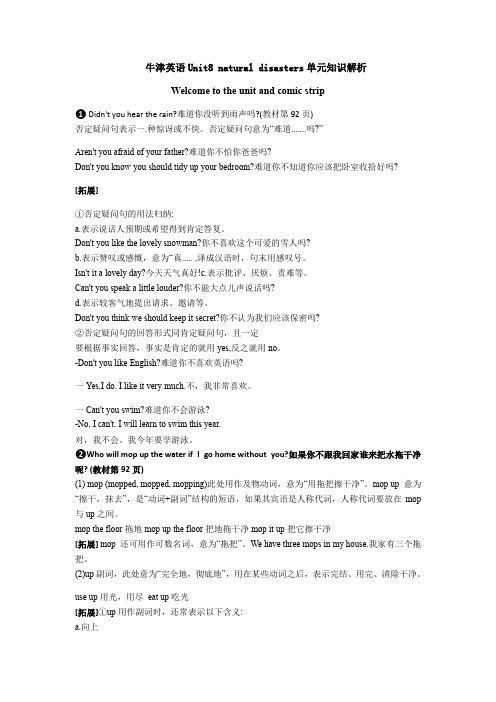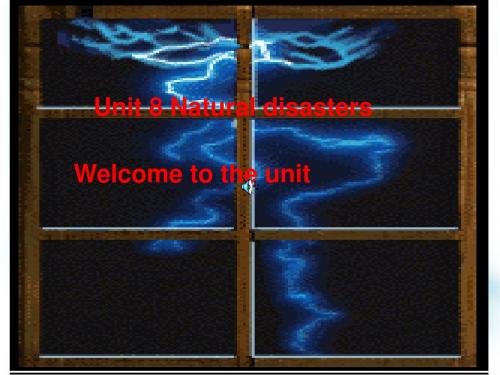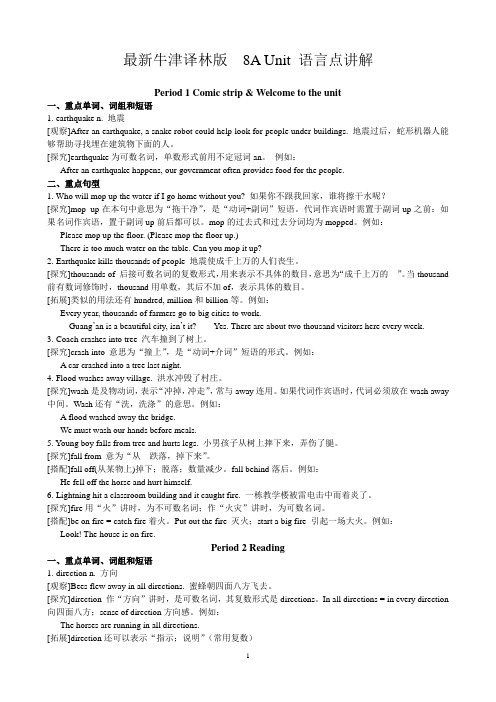Unit 8 Natural disasters Welcome to the unit 同步课件1 (牛津版八年级上)
牛津英语8A Unit8 natural disasters 单元知识解析

牛津英语Unit8 natural disasters单元知识解析Welcome to the unit and comic strip❶ Didn't you hear the rain?难道你没听到雨声吗?(教材第92页)否定疑问句表示一.种惊讶或不快。
否定疑问句意为“难道.......吗?”Aren't you afraid of your father?难道你不怕你爸爸吗?Don't you know you should tidy up your bedroom?难道你不知道你应该把卧室收拾好吗?[拓展]①否定疑问句的用法归纳:a.表示说话人预期或希望得到肯定答复。
Don't you like the lovely snowman?你不喜欢这个可爱的雪人吗?b.表示赞叹或感慨,意为“真..... ,译成汉语时,句末用感叹号。
Isn't it a lovely day?今天天气真好!c.表示批评、厌烦、责难等。
Can't you speak a little louder?你不能大点儿声说话吗?d.表示较客气地提出请求、邀请等。
Don't you think we should keep it secret?你不认为我们应该保密吗?②否定疑问句的回答形式同肯定疑问句,且一定要根据事实回答,事实是肯定的就用yes,反之就用no。
-Don't you like English?难道你不喜欢英语吗?一Yes,I do. I like it very much.不,我非常喜欢。
一Can't you swim?难道你不会游泳?-No, I can't. I will learn to swim this year.对,我不会。
我今年要学游泳。
❷Who will mop up the water if I go home without you?如果你不跟我回家谁来把水拖干净呢? (教材第92页)(1) mop (mopped, mopped, mopping)此处用作及物动词,意为“用拖把擦干净”。
八年级英语上册 Unit 8 Period 1 Welcome to the unit

fall 的相关短语
返回
① fall off 跌落 ② fall behind 落后 ③ fall down 落下 ④ fall into the habit of养成……的习惯 ⑤ fall over 摔倒
I have never heard of the place. hear of 听说 我从来没有听说过这个地方。 I haven’t heard from him for a long time. 我好长时间没有收到他的来信了。
hear from 收到……来信
返回
考题4:完成句子 (1) 你父亲要是听到这个显著的进步,一定会高兴的。 Your father will be happy to ___h_e_a_r__ _o_f_/_a_b_o_u_t__ this remarkable improvement. (2) [天津] 很高兴收到你的来信。 It’s great to ___h_e_a_r__ __f_r_o_m___ you.
温
—I ___C___ clothes in the bathroom. I didn’t hear the knock. 馨
提
A. am washing
B. have washed
示
:
C. was washing
D. washed
可
返
【点拨】考查动词时态。句意为“—Jim, 你为什么不给我开
回 原
7 Young boy falls from tree
4 Coach crashes into tree④
新牛津译林版英语八年级上册第八单元Welcome

flood
drought
sandstorm
fog and haze
earthquake
A car accident happened. It crashed into a tree .
Natural disasters are caused by natural forces(自 然因素).
They are different from accidents
.
caused by people
Are they about natural disasters?
1. School football team lost final. 2. Earthquake kills thousands of people. 3. Car accident kills three men. 4. Coach crashes into tree.
TALK
Act out the dialogue.
One day, Hobo went to Eddie’s home, because his own home was all__w__et____.
He was _s_l_ee_p_i_n_g__ when it started to
__ra_i_n___. When he __w_ok_e_u_p___, there was water e_v_er_y_w_h_er.eHe asked Eddie to
['θʌndɚ]
start a big fire
Some natural disasters
earthquake
fall down come down kill thousands of people
牛津译林英语八年级上册Unit 8 Welcome to the unit2

and answer theபைடு நூலகம்questions.
1. What happened to Vivien’s
school?
Lightening hit a classroom building and it caught fire. 2. When did it happen? It happened at night.
3. What was Hobo doing when it started to rain?
He was sleeping when it started to rain.
4. Did Hobo hear the rain? No he didn’t.
5. Why doesn’t he want to go home alone? He needs someone to help him
撞上
flood 洪水
The flood washed away the village.
冲走
thunder 雷 and lightning 闪电
storm 风暴,暴(风)雨
catch fire
着火
disaster mop up earthquake thousands of accident coach crash
What happened to Hobo?
Listen to the conversation and answer the questions.
1. What’s the weather like? It’s raining. 2. What happened to Hobo? His house is all wet.
rain
flood
Unit 8 Natural disasters Welcome-课件 八年级英语上册(牛津译林版)

Presentation
Listen and Answer
1. What happened to Vivien’s school last week?
There was a heavy storm with thunder and
lightning, and the school caught fire. 2. What caused the fire in Vivien’s school?
A: Did you hear about the…+时间?
B: No. What happened? A: It was in +地点.... (描述)
what
a flood
when
last month
where
Wuhan
consequence It washed away villages.
s(后果)
Presentation
Listen and imitate
Presentation
1. Pay attention to your tone and intonation (语调);
2. Use your body language.
Presentation
Let’s fill
一:此句是由when连接的复
typhoon
Sometimes bad weather may cause disasters.
Free Talk
A: What’s the weather like?
B: It’s…
foggy
windy
snowy
y
8上 Unit 8 Natural disasters 语言点讲解

最新牛津译林版8A Unit 语言点讲解Period 1 Comic strip & Welcome to the unit一、重点单词、词组和短语1. earthquake n. 地震[观察]After an earthquake, a snake robot could help look for people under buildings. 地震过后,蛇形机器人能够帮助寻找埋在建筑物下面的人。
[探究]earthquake为可数名词,单数形式前用不定冠词an。
例如:After an earthquake happens, our government often provides food for the people.二、重点句型1. Who will mop up the water if I go home without you? 如果你不跟我回家,谁将擦干水呢?[探究]mop up在本句中意思为“拖干净”,是“动词+副词”短语。
代词作宾语时需置于副词up之前:如果名词作宾语,置于副词up前后都可以。
mop的过去式和过去分词均为mopped。
例如:Please mop up the floor. (Please mop the floor up.)There is too much water on the table. Can you mop it up?2. Earthquake kills thousands of people 地震使成千上万的人们丧生。
[探究]thousands of 后接可数名词的复数形式,用来表示不具体的数目,意思为“成千上万的---”。
当thousand 前有数词修饰时,thousand用单数,其后不加of,表示具体的数目。
[拓展]类似的用法还有hundred, million和billion等。
例如:Every year, thousands of farmers go to big cities to work.---Guang’an is a beautiful city, isn’t it? ---Yes. There are about two thousand visitors here every week.3. Coach crashes into tree 汽车撞到了树上。
牛津译林版8A_Unit8_Natural_Disasters课件(共25张PPT)
crash into the tree
[kræʃ]
earthquake
['ə:θkweik]
kill many people
make people lose homes
TaskPrOacntei:sinCgomTpimeteition
1. lightning
fire
2. rainstorm
7.A young boy fell from a tree and hurt A his legs.
8.A big storm killed 20 people.
D
…
Because there is too much carbon dioxide flowing into the air.
Because our earth is becoming warmer and warmer.
It’s raining. My house is all wet.Can I come in, Eddie?
I was sleeping when it started to rain.
Sure, come in.
Did you hear the rain?
Why?
Not until half an hour later. You must come home with me now.
It can cause______________.
/ _M_a_n_y _h_o_us_e_s_w_il_l ___in the t_y_p_ho_o.n
Task Four:Think and judge (×or√)
× 1. When the earthquake comes, we should jump off the window.
牛津译林版英语八年级上册Unit8 Welcome to the unit 参考教案
Unit8 Welcome to the unit 参考教案I. Teaching ObjectivesTo get to know the topic of the unit ---natural disastersTo identify the vocabulary related to the topicII. Teaching ProceduresStep1. Talking about picturesShow the following picture to the students. Get then to guess what happened.Encourage the students to be creative and try to make different kinds of guesses. Get the students to listen to the tape and find out what happened.For weaker classes, get the students to talk about each picture.Get the students to read and practice the dialogue and then act the dialogue out. Encourage the students to add something to make the dialogue funnier.Step2. Getting to know the weatherSay ‘Rainy day s are very common. Now let’s see if you know the following kind of weather. ’For stronger classes, it is necessary to introduce more bad weather, like storm and sandstorm etc.Put it clear that bad weather sometimes can cause disasters (Teach the word ‘disaster’ and explain it in English ‘A natural disaster is a very bad accident caused by natural forces. It usually causes great damage or loss of life.’)Show pictures about the disasters and elicit the disasters, like flood, drought, tsunami, and hurricane, and earthquake etc.Step3. Making a summary about bad weather and disastersStep4. Finishing the exercises in Part AGet the students to finish the exercises in Part A and then check the answers.。
8A Unit8 natural disasters单元重点解析
8A unit8 单元重点解析Welcome to the unit and Comic strip知识详析.积累拓展1.Simon football team loses final.学校足球队输了比赛。
考点:lose意为“输掉”,与win互为反义词。
lost 是lose的过去式和过去分词,lose the final 意为“输了决赛”。
1lose the game 意为“输掉比赛”,win the game意为“赢得比赛”。
lose to sb /some team意为“输给某人或某队”。
如: Our class won the football match but lost the basketball match.我们班赢得了足球赛但输掉了篮球赛。
England lost to Australia. 英国队输给了澳大利亚队。
拓展:lose还可意为“失去;丢失”。
如: I lost my umbrella somewhere.我把雨伞不知丢在哪里了。
[中考典例]---The TV programme Voice of Youth is really great.---I think so. It_______the hearts of lots of fans since it started.A. lose and touchB. won and touchedC. has won and touchedD. has lost and hit答案:C解析本题考查动词辨析。
因为后面的since意为“自从”,是现在完成时态的标志词,所以这里选C和D;又因为下句要表达的句意是“我认为是这样的。
自从它开始以来就赢得了很多粉丝的心。
”所以这里选C。
难句解读1.Didn't you hear the rain?难道你没听到雨声吗?这种句型是一种否定形式的一般疑问句,相当于汉语中的反问句。
它是由助动词、情态动词、be动词的否肯定式(多用缩略式)加上主谓结构构成的。
8A_Unit8_Natural_disasters教案
8A Unit8 Natural disasters 教案第一课时Welcome to the unitTeaching aims:To introduce the topic of disaters.To identify vocabulary related to disasters.To identify weather conditions and label pictures with correct words.Focus and difficulties: To recognize the weather conditions and natural disaster.Teaching methods:Communication and descriptionTeacing aids:recorder Multi-media computerTeaching procedures:Step1 Lead in :T: What’s the weather like today?Ss: It …Revise some other words about weather.e.g. rain, snow, wind.…Step2 Presentation1.Show some pictures of snowstorm that happened inChina during last Spring Festival .Get them to answer the questions about it.﹙1﹚.Do you like snow in winter?﹙2﹚.Do you think too much snow is good or bad for people?2.Encourage students to tell their ideas.Show more pictures of bad weather.Ask: What caused the trouble or problems?Help students to answer : nature. They are natural disasters.They cause the bad weather .They make people get into the trouble.Step3 Practice1.T: Do you know what other natural disasters ? What words do we use to talk about bad weather ?Elicit from students other bad weather conditions. ( rainstorm, snow storm,typhoon.e.g.)ers with the class as a whole,then read together.Teach some new words.Step4 ActivityDivide the students into groups of four to discuss. Bring some photos to each group and ask students to write a headline about natural disasters or accidents.Step5 Presentation1.T: Look at the pictures ,people suffered from these natural disasters . What can we do to help them.Students will discuss it warmly. Then teacher leads students to the comic strip.2.T:Hobo has some trouble. What happened to him? Let’s have a look. Students look at the pictures. Teacher asks some open questions about each 2. Play the tape and students read after it.Explain some language points.Step 5.gamesAsk students to role-play the conversation.Step 6.Homework:Revises the contents we have learned.Preview Reading8A Unit8 Natural disastersReading(1)Teaching aims:1.To infer the meaning from the key words,pictures and the context.2.To elicit any information about the earthquakes in Taiwan or in other parts of the world.3.To develop the Ss’ability and skills reading comprehensioand let the Ss learn how to describe natural disastersDifficult points: The key words and phrasesthecomprehension of the story. Teaching methods: reading and talkingTeacing aids: recorder Multi-media computerTeaching procedures:Step1 Lead in :T: we have learnt some natural disastrs last time .What disasters have we leart?Encourage students to say something about the natural disasters.Show some picturs of an earthquake that happened in Wengchuan,sichuan on May12,2008 .Step4 Reading and answering1. Listen and read after the tape one paragraph by one paragraph.Check if they understand by asking more questions about the passage.2.Invite the students to read the whole passage in front of the class.Encourage them to mime and gesture in order to illustrate the different aspects of the experience.Step5. Practice1.Ask stuednts to read the sentences in the boxes in PartC and fill in the blanks. Check the answers with the whole class.2.Divide the students into groups of four.Retell the story ,then encourage some of them to retell in front of the class.Homework1.Recite the new words .2.Try to read the story as fluently as you can8A Unit8 Natural disastersReading(2)Teaching aims:1.To scan the passage.2.To explain some difficult and important language points and to use them.3.To make an interview about the earthquake.Difficult points:some language structuresTeaching methods: reading and talkingTeacing aids:recorder Multi-media computerTeaching procedures:Step1 revision1.Revise the names of natural disasters.2.Show the students the photos of the story of Taiwan earthquake and help them to retell it.Step2 ScanningScan each paragraph and encourage the students to tell their difficulties.Teacher helps students to solve them. Teacher explains language points to students.Step3 Activity1.Work in pairs . One acts as a reporter. The other acts as Timmy. Give some questions to help them.After that ask who he/she thinks is the best news reporter. Step4 DiscussionWhat can you do when you are in the earthquake ?What will you do when the others are in danger ?Homework1. Try to retell the story .2. Try to learn the useful words and sentences.8A Unit8 Natural disastersVocabularyTeaching aims:1. Students learn how to change nouns to adjectives.2. Learn to use the words and phrases to describe weather conditions.3. Get the students to use vocabulary to make a weather forecast. Teaching Aids:Multi-media computerDifficult points:To use the words and phrases to describe weather co nditioTeacing aids:Multi-media computerTeaching procedures:Step1 RevisionHelp students to revise Reading.Step2 Presentation1. Revise the name of natural disasters,and say‘many natural disasters arecaused by bad weather. Let’s talk about the weather.’2.Teach the new words by showing pictures.3.Ask students to finish PartA quickly and read aloud these words .Step3 Practice1. Get the students to find out the rule of changing the nouns into adjectives.2.Games. Ask students to draw pitures of different weather ,Students take turns to show the pictures ,the rest of the class say the noun and adjective describing the pictures.3.Elicit from students as many different as weather conditions as possible.4.Get some pairs to make up the dialogue.(What kind of weather do you like/dislike? Why?)Step4Presentation1.Talk about the weather forecast.2.Finish the dialogue in the book and check the answers.3.Look at the weather map and talk about the weather in China. Homework1.Try to rember the words about the weather .2.To make a Liyang’s weather forecas .8A Unit 8 Natural disasters GrammarTeaching Objectives:To learn more about the past continuous tense.To use the tense to talk about things.Teaching contents:Words: discuss, terrible, break, snowball, snowman, hitPhrases: search the Internet discuss…with… plan a trip to Tangshan on the side of the road drive you to school as usual break downSome others: project guidebook a terrible snowstormTeaching preparations:Tape recorderComputer PicturesTeaching procedures:Step1 Revision1.Check the homework and test the students about the new words and phrases that welearnt last lesson. Ask the students to work in pairs; one gives nouns that relate to the weather and then the other gives the adjectives quickly.2.Talk to the students about the bad weathers that can cause natural disasters.Step2 PresentationT:Here is an article, can you find out how many tenses are there in this article?Today is fine, the sun is shining brightly and it is a beautiful sunny day. I always get to school at 7 o’clock everyday, but I was late today because I couldn’t find the key to my bike. I think I will take a taxi to go home tonight.(let the students think of the simple present tense, simple past tense, present continuous tense and simple future tense, write down the rules)Compare the present continuous tense with the past continuous tense for the Ss, let them find out the differences. Then tell them when to use the past continuous tense.Step3 Practice (game time)T: Today we’ll learn the past continuous tense. First can you help me to find my key? The taxi is so expensive and I really want to enjoy the pretty day on my bike. I might leave my key somewhere and maybe someone took my key away. You can ask me questions toT: I was having dinner at 6:30p.m. last night. What was my father doing at that time?Do it for several times with the children and then let them try to make up sentences with the information in the timetable.What was our teach er doing…?What was her father/ her mother/ her little dog doing from… to…?(let the students ask these questions to practice the past continuous tense)Then the teacher asks:Was I having a shower at 6:00p.m.?Teach them: Yes, I was. No, I wasn’t.Yes, you were. No, you weren’t.Show the students the rules again and let them work in pairs.Step 4 Practice1. Let the Ss finish the exercise on page 99 and check the answers.2. T: We know that there are a lot of natural disasters in the world this year, for example, we have a terrible earthquake and a snowstorm in China. It brought a lot of troubles to our daily lives, what were they? (snowball, snowman, break down, fall down)3. Finish the exercise on page 100 and check the answers.4. Do more exercises.5. show the differences between the simple past tense and the past continuous tense. Step 7 HomeworkFinish the Workbook exercises.、8A Unit 8 Natural Disasters Integrated SkillsTeaching Objectives:To learn some useful expressions in case of the emergency call.To train the ability of getting details from the tape and use the information to finish the report form.To retell the accident with the information on the accident report call.Teaching contents:Words: condition cover caller arrival serious victim mobile phone Phrases: weather conditions cover the whole roadTime of arrival get worse Crash into catch fireSend the victim to…Sentences: She is as slim as I am.She is also helpful and is ready to help people any time.Betty wants to be a singer and travel around the world when she grows up.He has poor eyesight because of working on the computer too much at night.His legs are very long and they do not fit under the school desks.She is kind and never says a bad word about anyone.Teaching preparations:ComputerPicturesTape recorderTeaching procedures:Step 1 Warm-upT: What’s the weather like today? How can I know the weather a day earlier? (report)T: Through the weather report we can know the weather conditions. How many kinds of weather do you know? (windy, cloudy, sunny, rainy, snowy) And which do you think is the most interesting one? Why ?Show them the picture and say: The snow covers all the things and we can play with our friends. But if there is too much snow, it will be a disaster, and there will be some accidents on the road.Step 2 PresentationShow a picture about a car accident to the students.T: What can you see in the picture? (crash into). If there are some people in the car, they may hurt. So we call them “victims”. And we have to send them to the hospital, we can call what number?Teach the students some useful phone numbers.Present a picture.T: what information can you get from the picture? (a snowstorm, crash into a tree, trapped in the car, 2 people)T: they are Mr Su and Mrs Su, look at part A2 and fill in the blanks as many as you can. Then listen to the tape and try to complete the accident report form.Step 3 Practice1: listen to the tape and fill in the blanks. Play the tape again and then check the answers.2.listen for the third time and solve some problems that the students have.3.T: suppose that you are an reporter and now you are interviewing the couple, workwith your partner and try to make a dialogue. Here are some questions:What happened to you, Mr Su?Were you alone in the car?Why didn’t you get out by yourself?Step 4 Presentation1. T:Sandy told her e-friend about the snowstorm in her e-mail. Vivien also told her about a natural disaster in her school. Let’s listen to the conversation and find out what disaster it was.2. Play the tape and try to answer these questions:What happened in Britain?What caused the fire?Was anyone hurt?1.read after the tape and let the students themselves make up some dialogues using this asa model.Step 5 Homework8A Unit8 Natural disasterstaskTeaching aims:1. To tell the true information while writing.2. To give the outline of the writing.3. To write an article about the natural disaster.Teaching contents:Four skills:V ocabularies: nearby sandstorm warningPhrases: share….w ith…look out of the window forget to bring my keys Continue to fall around us come from behind fall overWeather report snowstorm warningOthers: Vocabularies: remove signal rollPhrases: the noise of traffic remove the snow typhoon signal number Teaching aids:Multi-media, recorderTeaching steps:Step 1: Presentation:1. Explain the language surrounding to the students, help them to understand the background.2. Divide all the students into 4 groups, read sandy’s notes (P105-A), and ask partners questions about the snowstorm, help the students to know the details of the storm.3. Read the notes together, and discuss about it in groups, the topic is what it is about ( the general speaking of the snowstorm --- before the snowstorm --- after the snowstorm)4. T: when we write an article, we should make a writing plan. One of the good ways to make the good writing plan is to draw a flow chart. Sandy drew a flow chart before writing. Look at the flow chart in part B and find the answer from part A.5. To ask questions with Sandy’s flow chart, and check the answers.Step2: Reading1. Read the article (P106-C), and ask: which part of the flow chart does each paragraph belong to?Para. 1: Introduction.Para 2-3: During the snowstorm.Para 4: After the snowstorm.2. Read the article again, finish part C.3. Let some students read the passage, and checkout.Step3:Writing.1. Work in pairs, think about the earthquake in Wenchuan Sichuan, write down some notes on the notebook, and give the flow chart like pare B, check out for each other, correct them and start writing.2. Encourage the students to get the sketch first and compare it with the flow chart. Find out the mistakes. The teacher can give some useful help, such as some words, phrases, and so on.3. Check the articles and read some of them.Step 4: Homework1. Recite some new words.2. Finish some exercises.。
- 1、下载文档前请自行甄别文档内容的完整性,平台不提供额外的编辑、内容补充、找答案等附加服务。
- 2、"仅部分预览"的文档,不可在线预览部分如存在完整性等问题,可反馈申请退款(可完整预览的文档不适用该条件!)。
- 3、如文档侵犯您的权益,请联系客服反馈,我们会尽快为您处理(人工客服工作时间:9:00-18:30)。
Talk about Eddie and hobo.
Listen to the dialogue and answer the questions: 1. What’s the weather like? It’s raining. 2. What happened to Hobo? He got wet.
game.
2. The earthquake in Taiwan killed
thousands of people.
√
3. A car accident killed three men.
4. A coach crashed into a tree last night. 5. A flood washed the village away. √ 6. Lightning started a big fire in a √ house. 7. A young boy fell from a tree and hurt his legs. 8. A big storm killed 20 people. √
in the world.
4. I am afraid I can’t go home
ithout you, or I’ll be w______
frightened. ong 5. You can’t sleep for too l_____, it’s a waste of time.
难句解析
Language points
1. crash vi.
(发出猛烈声音的) 碰撞,倒下, 坠毁 车子猛撞在树上。
The car crashed into a tree.
墙轰地倒了下来。 The wall crashed to the ground. 那飞机坠毁了。
The plane crashed. 2. wash away (指水)将… …冲走 海浪把那个游泳者卷走了。
3. What was Hobo doing when it
started to rain? He was sleeping.
4. When did Hobo hear the rain? Half an hour later. 5. What happened to Hobo’s house? The floor was all wet. 6. Why doesn’t he want to go home alone? He needs Eddie to mop all the water up.
“输给……”。例如:
We lost to a stronger side.
我们输给了实力更强的一方。
Thanks a lot!
Good bye!
The school football team lost the game. 该句中的lost是lose的过去式,意为“输, 失败”,用作及物动词,后常跟game,
war, case等词。例如:
I know he has lost the court case.
我知道他已经败诉了。
★此外,lose作“输,失败”讲时, 也可用作不及物动词,lose to意为
The waves washed away the swimmer.
3. hurt 伤害, 使受伤, 疼痛 他上月在那场交通事故中伤了腿, 现在还疼的厉害呢。 He hurt his left leg in the traffic accident last month, it still hurts badly now.
the pictures
drought
earthquake
flood
sandstorm
snowstorm
volcano
Are the about natural disaster? Put a
tick (√) in the correct boxes. 1. The school football team lost the
牛津版 八年级(8A) Unit 8
Comic strip & Welcome to the unitWhatLeabharlann s the weather like?
sunny
fog
A rainstorm
rain
thunder
lightning
typhoon
What’s the natural disasters in
首字母填空:
1.The floor is all wet, I will m____ op it up. 2.Many people lost their lives in the traffic a________. ccident
3.There are many natural d______ isasters
